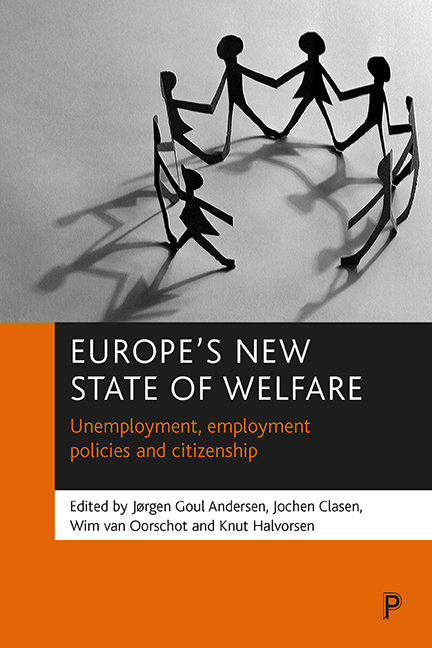Book contents
- Frontmatter
- Contents
- Notes on contributors
- Glossary
- Preface
- one Changing labour markets, unemployment and unemployment policies in a citizenship perspective
- two Employment and unemployment in Europe: overview and new trends
- three Unemployment and unemployment policy in the UK: increasing employability and redefining citizenship
- four To be or not to be employed? Unemployment in a ‘work society’
- five France: the impossible new social compromise?
- six Labour market participation in the Netherlands: trends, policies and outcomes
- seven Is high unemployment due to welfare state protection? Lessons from the Swedish experience
- eight Denmark: from the edge of the abyss to a sustainable welfare state
- nine Unemployment and (un)employment policies in Norway: the case of an affluent but oil-dependent economy: the paradox of plenty?
- ten Unemployment and unemployment policy in Finland
- eleven Slovenia’s navigation through a turbulent transition
- twelve Unemployment and unemployment policy in Switzerland
- thirteen Work, welfare and citizenship: diversity and variation within European (un)employment policy
- References
- Index
- Also available from The Policy Press
four - To be or not to be employed? Unemployment in a ‘work society’
Published online by Cambridge University Press: 20 January 2022
- Frontmatter
- Contents
- Notes on contributors
- Glossary
- Preface
- one Changing labour markets, unemployment and unemployment policies in a citizenship perspective
- two Employment and unemployment in Europe: overview and new trends
- three Unemployment and unemployment policy in the UK: increasing employability and redefining citizenship
- four To be or not to be employed? Unemployment in a ‘work society’
- five France: the impossible new social compromise?
- six Labour market participation in the Netherlands: trends, policies and outcomes
- seven Is high unemployment due to welfare state protection? Lessons from the Swedish experience
- eight Denmark: from the edge of the abyss to a sustainable welfare state
- nine Unemployment and (un)employment policies in Norway: the case of an affluent but oil-dependent economy: the paradox of plenty?
- ten Unemployment and unemployment policy in Finland
- eleven Slovenia’s navigation through a turbulent transition
- twelve Unemployment and unemployment policy in Switzerland
- thirteen Work, welfare and citizenship: diversity and variation within European (un)employment policy
- References
- Index
- Also available from The Policy Press
Summary
Despite all the problems it has faced during the past decades, Germany still has one of the most affluent and powerful economies of the world. Its high wages, while often accused of being a major cause of the country’s unemployment problem, are in fact a sign of an economy based on quality goods produced by a well-trained labour force (Lindlar and Scheremet, 1998). When measured against (average) productivity, they are not so high after all (Kaufmann, 1997; Heise et al, 1998). Consequently, Germany always has defined itself as a ‘work society’, a society whose affluence, and the distribution thereof, is based on skilled, diligent work.
This image of a ‘work society’ has been undermined by the persistently high unemployment rate during the past two decades (see Chapter Two, Table 2.1 of this volume). To be sure, the unemployment problems Germany has been facing since the early 1980s are not as poignant as in a number of other countries. However, on account of their perception of the work society, it took Germans quite some time to get accustomed to unemployment rates of 7 to 9%. Frequent warnings that high unemployment had paved the way for the Nazi regime were especially common during the late 1970s and the early 1980s, thereby providing additional arguments for a resolute strategy to create new employment. The public continually rates unemployment among the major social problems, and the fight against it is considered one of the foremost tasks of politics (see, for instance, Fridberg and Ploug, 2000).
This chapter examines unemployment policies in Germany during the past 15 years from a citizenship perspective. The term citizenship here denotes a social and political status that entails two things:
• the terms on which social recognition as a member of society is based;
• the circumstances on which social rights are granted.
The citizenship framework is helpful in a conceptual way. The encompassing social security provisions by the German welfare system have led some sociologists (Lepsius, 1979; Krätke, 1985; see also Offe, 1991) to conceive of one or several Versorgungsklassen, meaning a class (or several classes) whose income and status is based on welfare state provisions, such as the tenured civil servants or the recipients of retirement pensions.
- Type
- Chapter
- Information
- Europe's New State of WelfareUnemployment, Employment Policies and Citizenship, pp. 75 - 90Publisher: Bristol University PressPrint publication year: 2002



